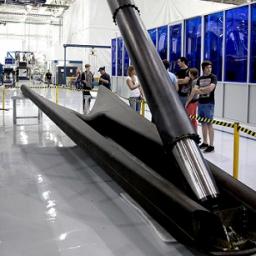Next Falcon 9 Rocket to Attempt Water Landing
 The wonderful nasaspaceflight.com reports that the next flight of the Falcon 9 rocket will attempt a soft water landing. The goal is to test the newly installed legs and confirm that the rocket can touch down in a controlled manner before future attempts at a landing on solid ground. The flights main mission is to resupply the ISS using the Dragon spacecraft. If all goes according to schedule, which it rarely does in the launch industry, liftoff will happen on March 16th.
The wonderful nasaspaceflight.com reports that the next flight of the Falcon 9 rocket will attempt a soft water landing. The goal is to test the newly installed legs and confirm that the rocket can touch down in a controlled manner before future attempts at a landing on solid ground. The flights main mission is to resupply the ISS using the Dragon spacecraft. If all goes according to schedule, which it rarely does in the launch industry, liftoff will happen on March 16th.